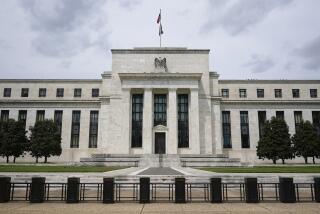Fast Check Handling Poses Hazards
- Share via
New federal regulations that will permit banks to process checks in a matter of hours instead of days went into effect today, prompting consumers groups to renew warnings about the increased likelihood of bounced checks and overdraft penalties.
Check 21 — short for the Check Clearing for the 21st Century Act — allows banks to transmit and clear checks by electronic facsimile instead of being required to physically ship the check to the bank that issued them for processing. The new regulations were prompted in part by the disruption of commercial aviation during the 9/11 attacks, which caused massive delays in check processing.
The ability to clear checks electronically will drastically reduce the “float” time, or the informal grace period of a day or more that now exists between the time a check is written and the time the funds are tapped. That could result in millions of bounced checks and costly fees for banking customers who have grown accustomed to the float, said consumer advocates.
Bank customers are not suppose to write checks against money they do not have in their accounts, but the practice is widespread.
“Check 21 will be a boon for the banks who will save billions of dollars once it’s fully implemented,” said Gail Hillebrand, senior attorney with Consumers Union’s West Coast office in a statement. “Consumers could end up losing out if they’re not careful and if banks use the new law as an excuse to bounce more checks and collect more fees.”
But it may take some banks years to fully take advantage of Check 21 to process and clear checks in a matter of hours.
Bank of America notified customers in their October statements of the upcoming changes. However, the bank expects that only 1% of the checks it handles will be processed electronically in a year’s time, said spokeswoman Betty Riess.
“There will be very little, if any, change that they will notice” in the near term, Riess said.
Still, some consumers warned check writers to start being more cautious starting today because some banks might move more quickly to implement electronic check clearing.
Consumer Union and other groups noted that Check 21 did not change the regulations that permit banks to put “holds” on some deposited funds, preventing the account holder from tapping those funds for several days or longer.
As a result, a bank customer who deposits a check and writes a check on the same day could bounce the check and face a penalty. That is because the check that is written could be cleared electronically in a matter of hours — well before the check that is deposited.
Banks “won’t be under any obligation to make funds from checks that consumers deposit into their accounts available any sooner,” Consumers Union said in a statement. “That could mean more bounced checks and more overdraft fees paid by consumers.”
Times staff writer Kathy M. Kristof contributed to this story.
More to Read
Inside the business of entertainment
The Wide Shot brings you news, analysis and insights on everything from streaming wars to production — and what it all means for the future.
You may occasionally receive promotional content from the Los Angeles Times.










